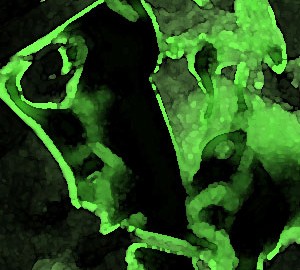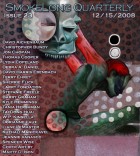As a huge fan of Robert Frost and Joyce’s “The Dead,” snow has come to mean so much to me. What does “snow” mean to you?—and what does it come to mean in “Danseuses Nues?”
This is going to be one of those disappointing answers; I don’t tend to think about the elements in my story in symbolic ways. I don’t deny that there’s symbolism there whenever you use something like snow in a story—I’m sure there is—but in my mind, when I write, “snow” is just snow —just frozen precipitation that lands on the planet and doesn’t drain away the way rain does. It comes to one of my stories because a story needs literal snow in order to have the right feel and the right setting. It needs cold, bright white stuff everywhere all around, covering things up and making it harder to walk and climb. It needs the landscape to be softened and made more treacherous by this frozenness. It’s in the story just because the story needed snow. That’s really a disappointing answer, isn’t it?
I’ll say one other thing, and maybe that’ll help. So many of the stories in my first short story collection, Between Camelots, had snow in them, and those were mainly sad stories. It may be that snow readily supports that kind of mood, but in this story I think it gets redeemed a little bit by getting to be part of a story that is, for me, joyous. Maybe I’m trying to redeem snow for myself.
At the end, there’s “the brightness of the realization.” What’s the key to getting that “brightness” at the end of a piece that has such a brief time to develop itself?
I think it’s all about focus. A brief story has to be so focused! I mean, if a novel ultimately wants to get to the point where a character has an epiphany, it has license, because of its length, to do so sort of inefficiently; it can wander off and do subplots and talk about side issues and side characters and all sorts of things. (Of course, in a good novel all of those diversions are secretly very relevant to what’s going on, but they can give the illusion of meandering.) In a very short story you have to stay clearly focused in order to have the exploration amount to something. In this story, I think every step in the narrator’s journey is a step toward understanding. There are not a million characters or plot points—just this one continuous journey.
Summarize, if you’d be so kind, the idea(s) of “Plot: A Question of Focus.” How do those ideas change within flash fiction, as opposed to, say, the short story?
There’s that word “focus” again—it’s something that interests me very much. The chapter comes from a very old idea—Aristotle’s idea—that every piece of drama (and, by extension, fiction), is about the struggle to answer a single yes/no question: Will Oedipus be brought down by fate? Will Holden Caulfield find a place where people aren’t so phony? In a Jane Austen novel (any of them, really), will Ms. So-and-so get married? The same goes for short stories; there’s a lot going on in them—texture, character, mood, setting, etc.—but the thing that drives the story forward is the Major Dramatic Question. That’s true of flash fiction, of course—the stuff surrounding the question is simpler, but there’s still that question. Maybe it’s a smaller one, but it’s still there.
I’ll tell you this, though—plot is a good thing to think about intensely for a while, and then it’s good to forget about it a little. I found that, after I wrote that chapter, I wrote a number of bad, bad, heavily plot-driven stories in a row. I had to forget the ideas a little in order to recover. Not that the ideas were ultimately harmful; the stuff I write these days is better, I think, than the stuff I wrote before the plot chapter—so I’ve gained from it, but only now that I’ve also put some distance on it. For that reason I don’t tend to try to figure out my stories questions’ explicitly—I just try to feel that they’re there.
How is the (very) short fiction form like and unlike poetry?
I think it’s very close to poetry, especially if you bring prose poems into the mix. I taught a class last year where I had my students try to distinguish short shorts from prose poems, and it was extremely difficult. In some cases it’s just a matter of the label chosen by the author.
As fiction gets shorter, the “story” part of things gets less important, I think. Novels tend to have complicated, elaborate structures, and that becomes less and less the case as the fiction shrinks in size. Once you’re down to very short stories, I think story, narrative, is de-emphasized, and observation—observation of the world, of a moment, of emotion—is emphasized. The piece becomes more lyric than narrative, and in that sense becomes like lyric poetry. Still, usually what makes it fiction (I think) is that narrative plays a bigger role in it than in the typical lyric poem.
You teach creative writing at Earlham College. What’s the key to being a great creative writing teacher?
Well, of course you have to have a sharp eye for the way that writing works. You have to see what a line break does to a poetic thought, what a certain turn of phrase does to a stretch of dialogue, what an overall choice of structure or mood does to a piece. That’s the kind of literary smarts you have to have. But more important than that, I think, is the understanding that the students in front of you are there because they have something to express and that they are probably nervous or self-doubting or even horrified about expressing it—the understanding that your students have souls and that those souls need to be guided with compassion, and a certain amount of protectiveness, in the direction they must go (whether they want to go there or not). In addition to being sharp-eyed, the great writing teacher is partly priest, partly guide into the wilderness, partly guardian angel.



 The core workshop of SmokeLong Fitness is all in writing, so you can take part from anywhere at anytime. We are excited about creating a supportive, consistent and structured environment for flash writers to work on their craft in a community. We are thrilled and proud to say that our workshop participants have won, placed, or been listed in every major flash competition. Community works.
The core workshop of SmokeLong Fitness is all in writing, so you can take part from anywhere at anytime. We are excited about creating a supportive, consistent and structured environment for flash writers to work on their craft in a community. We are thrilled and proud to say that our workshop participants have won, placed, or been listed in every major flash competition. Community works.